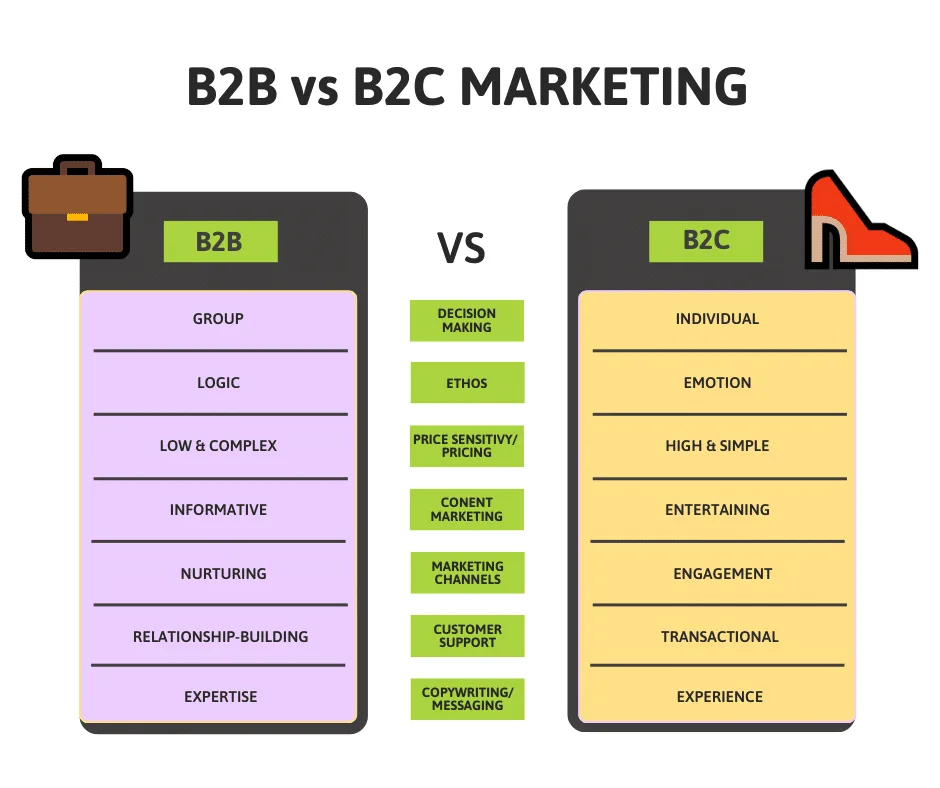Marketing strategies differ significantly depending on whether you’re targeting businesses (B2B) or individual consumers (B2C). Understanding these differences and similarities is crucial for crafting campaigns that resonate with your target audience. Let’s explore seven major differences and three overlaps between B2B and B2C marketing.
Also Read: The Importance of Content Marketing in the Digital Age
What Is B2B Marketing?
Business-to-business (B2B) marketing focuses on selling products or services to other businesses. These transactions are often based on logic, expertise, and long-term relationships.
What Is B2C Marketing?
Business-to-consumer (B2C) marketing targets individual consumers. It often emphasizes emotional appeal, convenience, and quick decision-making to drive sales.
7 Key Differences Between B2B and B2C Marketing

1. Target Audience
- B2B: The target audience consists of decision-makers within a company, such as managers, executives, or procurement teams.
- Example: Marketing software to IT departments.
- B2C: The target audience is individual consumers looking to fulfill personal needs or desires.
- Example: Selling a smartphone to a tech-savvy individual.
2. Purchase Motivation
- B2B: Purchases are driven by logic, ROI, and business needs. Buyers seek solutions that can improve efficiency, reduce costs, or increase profits.
- B2C: Emotional factors like desire, status, or convenience often influence purchases. Buyers look for products that enhance their lifestyle.
3. Sales Cycle
- B2B: The sales cycle is typically longer, involving multiple stakeholders, approvals, and research. Trust and relationship-building are essential.
- B2C: The sales cycle is shorter, with quicker purchasing decisions, often made on impulse or after minimal research.
4. Content and Messaging
- B2B: Content focuses on detailed, technical information and value propositions. Common formats include white papers, case studies, and webinars.
- B2C: Messaging is often simpler and more engaging, with an emphasis on storytelling and visuals. Formats include social media posts, videos, and product reviews.
5. Marketing Channels
- B2B: Common channels include LinkedIn, email marketing, and industry-specific events or webinars.
- B2C: Platforms like Instagram, Facebook, and TikTok are popular for reaching individual consumers. Retail stores and e-commerce websites also play a key role.
6. Relationship Building
- B2B: Relationships are long-term and built on trust, reliability, and consistent performance. Networking and personal connections matter.
- B2C: Relationships are often transactional, focused on delivering value quickly and ensuring customer satisfaction.
7. Pricing and Negotiation
- B2B: Pricing is often custom, involving negotiations, contracts, and bulk discounts. Transparency and flexibility are critical.
- B2C: Pricing is usually fixed, straightforward, and designed to appeal to consumer budgets, with occasional promotions or discounts.
3 Key Similarities Between B2B and B2C Marketing
1. Need for Customer Understanding
Both B2B and B2C marketing require a deep understanding of the target audience. Marketers must know their audience’s pain points, preferences, and behavior to create effective campaigns.
- Example: A B2B marketer might identify a business’s need for efficient CRM software, while a B2C marketer could focus on a consumer’s desire for user-friendly apps.
2. Importance of Branding
Strong branding builds trust, credibility, and recognition in both B2B and B2C markets. While the approach may differ, the goal remains the same: establishing a reputable image.
- Example: IBM (B2B) is known for reliability in enterprise solutions, while Apple (B2C) appeals to consumers with innovation and design.
3. Leveraging Data and Analytics
Data-driven strategies are vital for both segments. Marketers analyze customer behavior, track campaign performance, and use insights to refine their strategies.
- Example: A B2B company might use analytics to optimize lead generation campaigns, while a B2C company uses data to personalize product recommendations.
How to Succeed in B2B and B2C Marketing
For B2B Marketing:
- Focus on Education: Provide in-depth content like white papers, case studies, and how-to guides.
- Emphasize ROI: Clearly demonstrate how your product or service can solve a business challenge.
- Build Relationships: Invest in long-term relationship-building through networking, personalized emails, and dedicated account managers.
For B2C Marketing:
- Appeal to Emotions: Use storytelling and visuals to connect emotionally with your audience.
- Leverage Social Media: Engage consumers on platforms they frequent with fun, shareable content.
- Simplify the Process: Ensure the purchasing journey is quick, easy, and enjoyable.
Conclusion
While B2B and B2C marketing have distinct characteristics, both share common ground in their ultimate goal: satisfying the needs of their audience. B2B marketing thrives on logic, relationships, and detailed solutions, while B2C marketing focuses on emotions, convenience, and instant gratification.
At Osumare Marketing Solutions, we understand these nuances and craft tailored strategies to help businesses succeed in both B2B and B2C markets. Whether you’re looking to build long-term relationships with decision-makers or captivate individual consumers, our expertise in digital marketing ensures optimal results.
By understanding these differences and similarities, marketers can effectively connect with their target audience, whether engaging with a business decision-maker or an individual consumer. Learn more about how Osumare Marketing Solutions can support your marketing efforts by visiting our website: ahmedabad.osumare.com.

